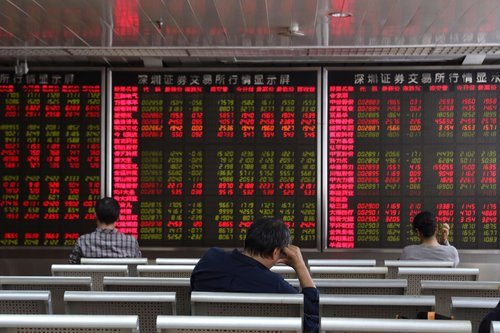Global markets are jittery ahead of the US-China trade talks

Global stocks were briefly in the red early Thursday ahead of the the latest round of US-China trade talks, but they’ve mostly pared losses as anxiety about the discussions eases.
South Korea’s Kospi was the biggest loser in Asia, falling more than 1% soon after the market opened — its first day of trading after a holiday. But the index has pulled higher, and is now trading down about 0.8%.
Other markets in Asia were briefly down in earlier trading, but they’ve all since moved higher. Japan’s Nikkei 225 was up 0.4%, after falling as much as 0.7%.
Hong Kong’s Hang Seng Index, meanwhile, added 0.3% following a lower open. And China’s Shanghai Composite Index traded 0.4% higher following slight losses at the open.
All eyes are focused on Washington, where discussions between top US and Chinese negotiators are scheduled to take place Thursday. But prospects of a sweeping trade deal appear to be dimming.
American negotiators are entering this week’s trade talks with low expectations for major progress on reaching a comprehensive deal, two officials familiar with the situation told CNN.
US futures, meanwhile, briefly plunged more than 1% early in the Asia morning after the South China Morning Post reported that the Chinese delegation could depart Washington earlier than expected. The talks are scheduled for two days.
The White House, though, told CNN that it is not aware of a change in travel plans for Chinese Vice Premier Liu He at this time. Dow, S&P 500 and Nasdaq futures recovered most of their losses by mid-morning in Asia. By 10:45 a.m. HKT, Nasdaq futures were flat, while Dow and S&P 500 futures were each down roughly 0.1%.
Tensions are rising ahead of Thursday’s trade talks. Earlier this week, the United States imposed visa restrictions on Chinese officials and blacklisted 28 Chinese entities for alleged involvement in human rights abuses against Uyghur Muslim and other minority groups in China’s far western Xinjiang region. The moves have upset Beijing.
Among the targets of the US blacklist were a handful of Chinese technology companies. Two of them, the surveillance camera maker Hikvision and its rival Dahua Technology, plummeted 6% and 6.7%, respectively, in Shenzhen on Thursday. Both stocks resumed trading for the first time since they were suspended Tuesday shortly after the US blacklist was announced.



